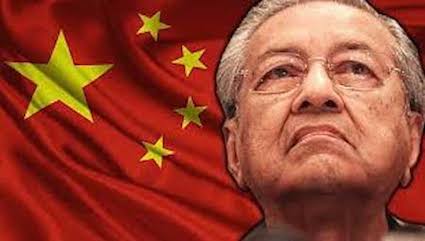‘We Cannot Afford This’: Malaysia Pushes Back Against China’s Vision

A country that once courted Chinese investment now fears becoming overly indebted for big projects that are neither viable nor necessary — except to China.
(NYT) – In the world’s most vital maritime chokepoint, through which much of Asian trade passes, a Chinese power company is investing in a deepwater port large enough to host an aircraft carrier. Another state-owned Chinese company is revamping a harbour along the fiercely contested South China Sea.
Nearby, a rail network mostly financed by a Chinese government bank is being built to speed Chinese goods along a new Silk Road. And a Chinese developer is creating four artificial islands that could become home to nearly three-quarters of a million people and are being heavily marketed to Chinese citizens.
Each of these projects is being built in Malaysia, a Southeast Asian democracy at the heart of China’s effort to gain global influence.
But where Malaysia once led the pack in courting Chinese investment, it is now on the front edge of a new phenomenon: a pushback against Beijing as nations fear becoming overly indebted for projects that are neither viable nor necessary — except in their strategic value to China or use in propping up friendly strongmen.
At the end of a five-day visit in Beijing, Malaysia’s new leader, Mahathir Mohamad, said on Tuesday that he was halting two major Chinese-linked projects, worth more $22 billion, amid accusations that his predecessor’s government knowingly signed bad deals with China to bail out a graft-plagued state investment fund and bankroll his continuing grip on power.
His message throughout his meetings with officials, and in public comments, has been unambiguous.
“We do not want a situation where there is a new version of colonialism happening because poor countries are unable to compete with rich countries,” Mr. Mahathir said on Monday at the Great Hall of the People in Beijing after meeting with Premier Li Keqiang.
or a time it appeared that China’s standard playbook for gaining favor was working in Malaysia. It had successfully courted Mr. Mahathir’s predecessor, Najib Razak, with easy loans and showcase projects, and secured deals that were of strategic value for its ambitions.
But in May, Mr. Najib was voted out of office by an electorate tired of the corruption scandals swirling around him, some of which involved China’s highest-profile investment deals in Malaysia.
Mr. Mahathir, 93, was voted into office with a mandate that included getting the country out from under its suffocating debt — roughly $250 billion of it, some of it owed to Chinese companies.
From Sri Lanka and Djibouti to Myanmar and Montenegro, many recipients of cash from Chinese’s huge infrastructure financing campaign, the Belt and Road Initiative, have discovered that Chinese investment brings with it less-savory accompaniments, including closed bidding processes that result in inflated contracts and influxes of Chinese labor at the expense of local workers.
Fears are growing that China is using its overseas spending spree to gain footholds in some of the world’s most strategic places, and perhaps even deliberately luring vulnerable nations into debt traps to increase China’s dominion as the United States’ influence fades in the developing world.
“The Chinese must have been thinking, ‘We can pick things up for cheap here,’” said Khor Yu Leng, a Malaysian political economist who has been researching China’s investments in Southeast Asia. “They’ve got enough patient capital to play the long game, wait for the local boys to overextend and then come in and take all that equity for China.”
In his action in Beijing on Tuesday, Mr. Mahathir said he was halting a contract for the China Communications Construction Company to build the East Coast Rail Link, thought to have cost the government around $20 billion, along with a $2.5 billion agreement for an arm of a Chinese energy giant to construct gas pipelines. He had earlier suspended the projects, leading some analysts to believe he wanted to renegotiate the terms during his China trip. Instead, he announced that the deals were off for now.
“It’s all about borrowing too much money, which we cannot afford and cannot repay because we don’t need these projects in Malaysia,” Mr. Mahathir said.

